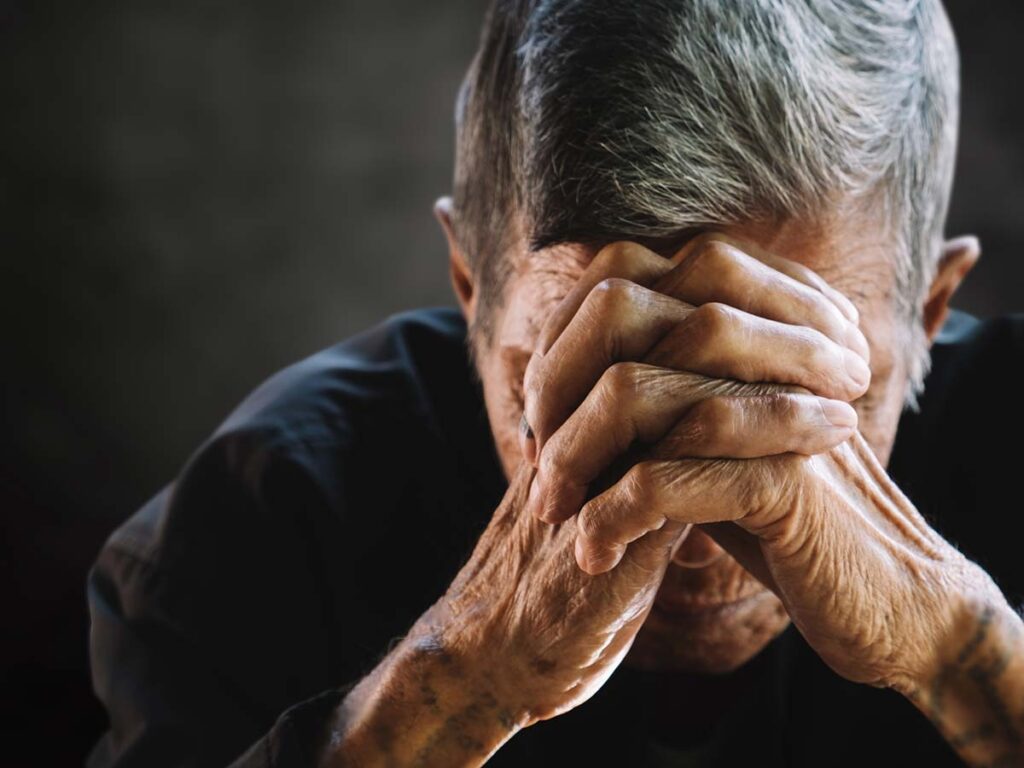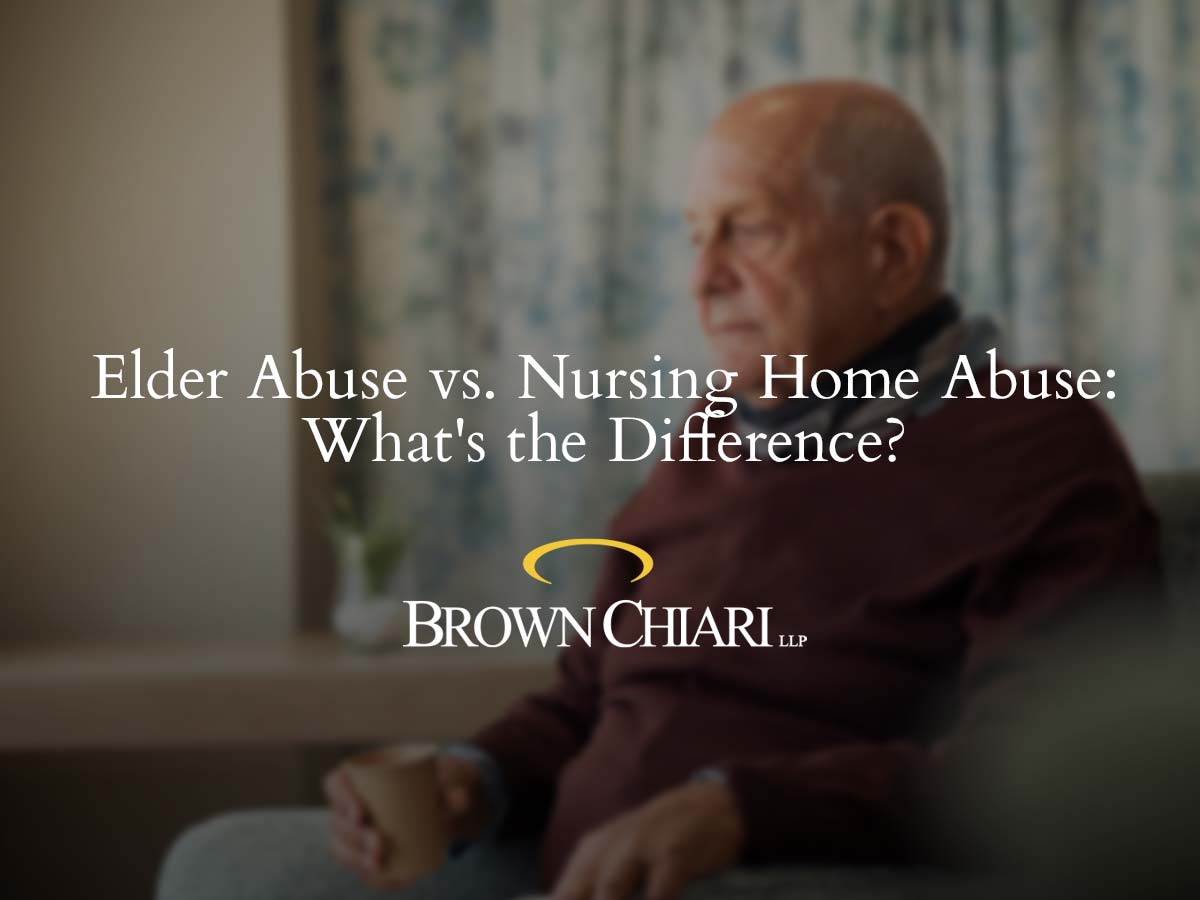Elder abuse and nursing home abuse are serious issues affecting some of the most vulnerable members of our community — older adults who rely on others for care and support. While the two terms are often used interchangeably, they have key distinctions that are important for families, caregivers, and advocates to understand.
This blog will clarify the difference between elder abuse and nursing home abuse, highlight the types of abuse older adults may face, and explain how family members can recognize signs of mistreatment. If you suspect abuse of a loved one, knowing the right steps to take can protect their well-being and hold responsible parties accountable.

What Is Elder Abuse?
Elder abuse refers to the mistreatment, neglect, or exploitation of an elderly person, often by someone in a position of trust. This abuse can happen in community settings, private homes, or other environments where older adults receive care. Unlike nursing home abuse, elder abuse is not limited to care facilities. It can be perpetrated by family members, caregivers, or even strangers.
There are several forms of elder abuse, including:
- Physical abuse: Inflicting pain or injury through force, such as hitting, pushing, or using physical restraints.
- Sexual abuse: Forcing an older person to engage in non-consensual sexual contact or acts, which is legally considered sexual abuse.
- Financial abuse: The unauthorized use or theft of an elderly person’s financial resources, often referred to as financial elder abuse.
- Emotional abuse: Verbal threats, insults, or psychological manipulation that causes emotional harm.
- Elder neglect: Failing to meet an elderly person’s basic needs for food, shelter, or medical care, often leading to unexplained injuries or deteriorating health.
In many cases, elder abuse occurs in private homes where caregivers may not be monitored. Adult protective services (APS) are often the first responders in these situations, investigating reports of elder abuse and connecting vulnerable seniors to needed resources.
What Is Nursing Home Abuse?
Nursing home abuse occurs within nursing homes, assisted living facilities, and other residential care facilities where nursing home residents rely on staff members for daily care. Unlike elder abuse, nursing home abuse is specific to care provided in institutional settings, and it often involves abuse or neglect by nursing home staff members, caregivers, or even other residents.
Types of nursing home abuse include:
- Physical abuse: Use of force that results in injury, pain, or impairment, such as pushing, hitting, or using physical restraints.
- Sexual abuse: Non-consensual sexual contact or sexual assault of nursing home residents by staff members, other residents, or visitors.
- Financial abuse: Theft or misuse of a resident’s money, benefits, or property, which can include unauthorized withdrawals or fraudulent changes to financial documents.
- Emotional abuse: Verbal abuse, intimidation, threats, or actions that cause emotional harm to nursing home residents.
- Nursing home neglect: Failure to provide adequate care, such as food, water, hygiene, and medical care, which can result in serious injury or health complications.
Nursing home residents are among the most vulnerable members of our society. They often suffer from medical conditions, limited mobility, or mental illness like Alzheimer’s disease, making them more dependent on caregivers. As a result, they face a higher risk of abuse and neglect.
Key Differences Between Elder Abuse and Nursing Home Abuse
While elder abuse and nursing home abuse share similarities, their key differences lie in where and how the abuse occurs.
| Factor | Elder Abuse | Nursing Home Abuse |
| Location | Occurs in homes or community settings | Occurs in nursing homes or assisted living facilities |
| Perpetrators | Family members, caregivers, or strangers | Nursing home staff members, caregivers, or other residents |
| Victims | Any elderly person in a care relationship | Residents of nursing homes or assisted living facilities |
| Reporting | Handled by adult protective services (APS) | Investigated by state survey agencies and local police |
The environment where neglect occurs also affects how it is reported and investigated. For elder abuse, adult protective services are often the first to intervene. For nursing home abuse, state survey agencies and regulatory bodies conduct investigations, and families may file complaints with local police or health departments.
Signs of Abuse and Neglect in Nursing Homes and Elderly Care
Identifying signs of abuse and neglect can help protect older adults from serious harm. Family members, friends, and caregivers should be aware of the following warning signs:
- Physical abuse: Unexplained injuries, bruises, broken bones, or marks from physical restraints.
- Sexual abuse: Bruising or injuries near sensitive areas, sexually transmitted infections, or emotional distress linked to sexual assault.
- Nursing home neglect: Poor personal hygiene, malnutrition, dehydration, bedsores, and failure to provide adequate care.
- Financial abuse: Sudden changes in financial documents, missing money, or unexplained bank withdrawals.
- Emotional abuse: Fear, withdrawal, anxiety, depression, and avoidance of specific staff members or residents.
If family members suspect abuse, it is important to document the signs and report them immediately. Nursing home abuse attorneys can help victims and their families gather evidence and seek justice.
How to Report Elder Abuse or Nursing Home Abuse
If you suspect abuse of a loved one in a nursing home or any other care setting, there are several actions you can take to protect them:
- Report it to facility administrators: If the abuse occurs in a nursing home, inform the management. They have a legal duty to investigate and address claims of abuse.
- Contact adult protective services (APS): If elder abuse occurs in a home or community setting, APS will investigate the claim.
- File a report with state survey agencies: These agencies oversee nursing home inspections and can investigate claims of abuse or neglect.
- Call local police: If the victim is in immediate danger, call 911 or the local police. Criminal penalties may apply if evidence of abuse or sexual assault is found.
- Contact a nursing home abuse lawyer: Nursing home abuse attorneys can help families hold responsible parties accountable for mistreatment. They can also help gather evidence and pursue legal claims for compensation.
How Brown Chiari LLP Can Help
If your loved one has suffered abuse in a nursing home, Brown Chiari LLP can help you seek justice. Our experienced nursing home abuse lawyers have a proven track record of holding nursing homes accountable for abuse and neglect. We provide a free case review and help families gather evidence, build a claim, and pursue compensation for their loved ones.
Learn more about elder abuse vs. nursing home abuse: what’s the difference? Call Brown Chiari LLP at (716) 681-7190 to schedule your free, no-obligation consultation. You can also reach us anytime through our contact page. Let us help you take the first step toward justice and recovery.
Frequently Asked Questions
What is considered elder abuse?
Elder abuse includes physical abuse, emotional abuse, sexual abuse, financial exploitation, and elder neglect. It can happen in homes, community settings, or care facilities and may be committed by family members, caregivers, or strangers.
How do I report elder abuse?
You can report elder abuse to adult protective services, state survey agencies, local police, or a nursing home abuse lawyer. If the victim is in immediate danger, call 911.
What is the difference between nursing home abuse and elder abuse?
Elder abuse occurs in homes, community settings, and care facilities, while nursing home abuse is specific to abuse that occurs in nursing homes or assisted living facilities. The abusers in elder abuse cases may be family members, caregivers, or strangers, while in nursing homes, the abuse is often committed by staff members or other residents.
What are signs of abuse or neglect in nursing homes?
Signs of abuse or neglect include unexplained injuries, signs of sexual assault, poor personal hygiene, malnutrition, dehydration, and emotional distress. Family members should report these signs immediately to nursing home staff or authorities.
Can I sue a nursing home for abuse?
Yes, families can sue nursing homes for abuse or neglect if evidence shows that staff members, management, or other residents harmed their loved one. Nursing home abuse attorneys can help gather evidence and pursue compensation for victims.
If you have more questions about elder abuse, nursing home neglect, or your loved one’s rights, contact Brown Chiari LLP for a free case review. We are committed to protecting the rights and well-being of vulnerable seniors in Buffalo and across New York.
